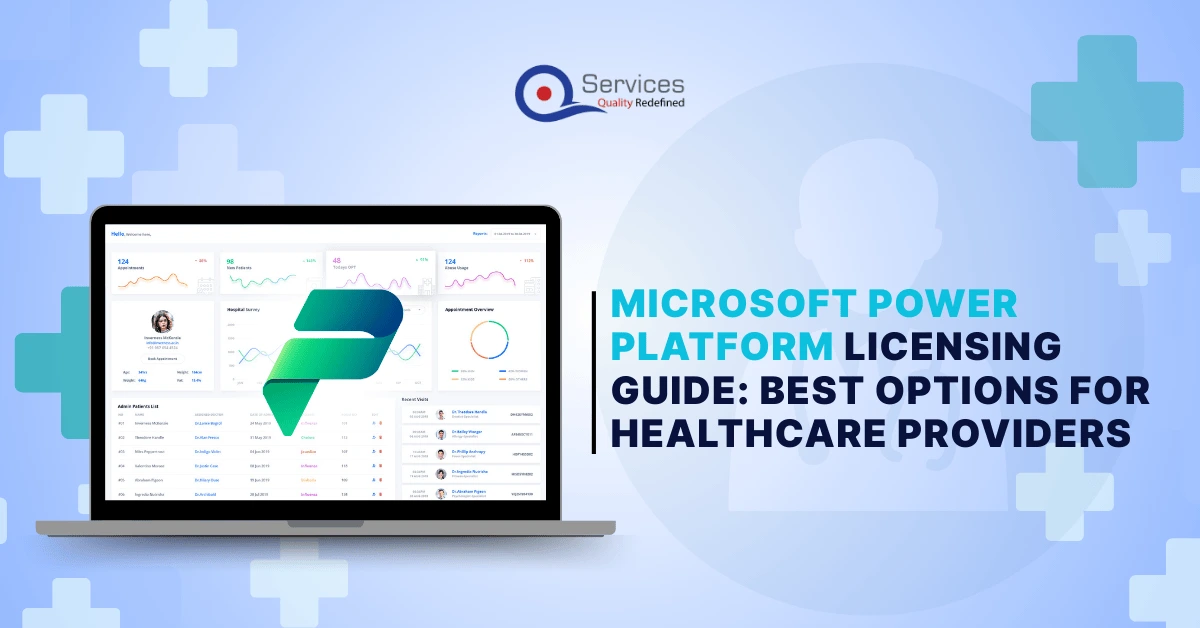
Rewards
.





CANADA
55 Village Center Place, Suite 307 Bldg 4287,
Mississauga ON L4Z 1V9, Canada
Certified Members:
.



Home » Maximizing Patient Engagement with AI-Enhanced Automated Systems: A Practical Approach

The term patient engagement is highly valuable for healthcare professionals. They know how important it is to get to the core of the patient’s problem and provide treatments to ensure proper recovery.
Earlier, patient engagement used to be a long and hectic where patients had to wait for hours in queue to meet the doctors, and even after that they were not able to discuss deeply about their problems. Nowadays, patients don’t need to wait to get personalized health treatments. The evolution of artificial intelligence has broadened its feathers in the healthcare industry, providing one-on-one support to customer queries and responding to them in minutes.
AI-enhanced systems not only strengthen patient satisfaction and trust but also offers clinical benefits as it automatically handles several tasks. However, to fully maximize the advantages of AI in healthcare, a deeper understanding of these technologies is essential. Read this blog to get complete information about AI’s role in improving patient engagement.
The introduction of Artificial Intelligence into healthcare has enhanced the way of interaction between patients and healthcare providers. This emerging technology is powered with various AI tools to help both patients and health professionals. It aids in improving a patient’s experience by providing quick medical information, personalized communication, predicting future health outcomes, and more.
Furthermore, these technologies support health practitioners in prescribing and improving the quality of care by handling the majority of administrative tasks.
Here’s how several AI-powered technologies help with healthcare:
Chatbots & Virtual Agents: These intelligent technological models promote effective patient engagement by solving their queries, providing information, and scheduling appointments in the real time. These models are built with a combination of data processing, Machine Learning and Natural Language Processing to provide human-like responses within seconds.
Predictive Analytics Models: AI-powered predictive analytics analyzes patient data to identify health risks, recommend personalized treatments, and prevent complications. By offering real-time alerts and tailored interventions, it enhances patient engagement, reduces hospital readmissions, and enables proactive healthcare management.
AI Integrated Wearable Devices: AI-powered wearables, like bands and smartwatches, keep patients engaged with their health monitoring metrics. These tools help patients gain deep insights into their health while also providing previously recorded data (if synced to EHRs) to health professionals for better treatment.
Telemedicine Platforms: Telemedicine platforms offer healthcare advice from a distance (through chats or video calls). They help patients spot possible symptoms, keep an eye on health, and decide if they need treatment. This keeps patients involved and gathers more info to give personalized results.
The development of AI has brought many changes in the healthcare sector. As per some research studies, the interactions between patients and healthcare providers have improved considerably and the quality of treatments has been enhanced too. Here’s how it impacted patient engagement:
Intelligent AI tools like chatbots and virtual assistants has improved the way of communicating with doctors. These tools answer patients’ questions, schedule appointments, and remind them to take medication. This improves access and cuts down wait times for help.
AI powered devices such as, wearables and sensor devices are designed to monitor vital signs and health conditions while providing real-time feedback. This not only keeps the patients involved with their health journey but also provides healthcare providers with continuous updates on the progress of various treatment plans.
AI helps patients by predicting any possible health risks. Machine learning algorithms use health data to look for early signs of growing conditions so that those within the care team can offer preventive care to help mitigate complications before they become significant.
AI systems are optimizing follow-up care. With reminders and personalized assistance, patients are actively engaged in the management of their health, whether remembering appointments or adhering to prescribed treatments, and it is easy to stay in line with their treatment schedule.
Dedicated health professionals highly prioritize patient’s interactions and engagement. With the implementation of AI technology, they can easily grab more insights to offer better solutions and quality care.
Adopting these technological advancements not only improves patient engagement but also benefits health professionals in building customer’s trust and confidence. Here are some of the dual-side benefits of AI technology:
AI allows health professionals to recognize the uniqueness of each patient in detail through the analysis of medical history, current health status, and lifestyle factors.
This technology creates customized care plans that adapt to specific needs, making medical care more effective and relevant to each individual. The system adjusts recommendations based on the response of patients to treatments, ensuring they receive the best suited care.
AI technologies provide round-the-clock access to healthcare support for patients in the form of virtual assistants and chatbots. These can respond to common health questions, remind patients about medications, and send an emergency alert to the healthcare team if needed. This 24/7 access builds confidence among patients and solves health problems without waiting for office hours.
AI systems in wearables and smart sensors monitor vital signs as well as health indicators of patients on a real-time basis. The technology catches alarming deviations in health patterns and if it’s integrated with health monitoring apps, the system notifies medical staff.
This type of monitoring helps to mitigate risks and allows for intervention at the earliest possible time, which is advantageous for the patients.
AI automates many routine healthcare tasks, which reduces the time patients spend on administrative processes. For instance, the technology has the ability to handle appointment scheduling, prescription refills, and basic health inquiries automatically.
This efficiency cuts down on healthcare costs and allows medical staff to focus on more complex patient needs. Patients save money through fewer unnecessary visits and more efficient care delivery.
AI provides patients with relevant health information based on their specific condition and treatment options. The technology presents complex medical information in a clear and understandable way and provides relevant resources when patients need it.
This enhanced understanding helps patients make better health decisions and actively participate in their treatment process.
Get free Consultation and let us know your project idea to turn into an amazing digital product.
The use of AI and Machine Learning (ML) in healthcare for patient engagement has proven to be effective, with quality care enhanced by a significant percentage. Here are some of the most common AI-integrated technologies that are raising the standards of healthcare:
AI-Powered Chatbots & Agents
These intelligent virtual assistants are known for providing immediate responses to patient queries related to medication, symptoms, and general health concerns. Chatbots are available 24/7 to help patients with daily questioning, booking follow-up appointments, and sending medication reminders. This technology helps healthcare providers to handle meaningful patient interactions with well-researched care.
AI Voice Assistants
Voice-activated AI systems are extremely popular among patients, especially in disabled or old patients. It allows them to interact with their health care providers and ask for emergency assistance just by voice commands. These assistants work by recording symptoms and reminding them about their medicines, thus making healthcare accessible and effective.
AI-Powered Health Recommendations
With the analysis of patient’s previous data, including medical history, lifestyle factors, and current health status, AI recommends personalized health solutions to increase patient engagement. These systems offer preventive care suggestions, lifestyle modifications, and treatment adherence support to help patients make informed decisions about their health.
AI-Driven Appointment Scheduling
Smart schedulers analyse patient needs, provider availability, and feasibility in last appointments in order to optimize booking procedures. This AI-driven approach ensures fewer waiting times, less scheduling conflicts, and prompt handling of emergency cases to establish quick access to health care for both the patients and the service providers.
AI for Health Insurance
The use of AI in health insurance automates several repetitive tasks such as processing claims, verifying coverage, and predicting costs and risks. These systems help patients understand their benefits, estimate expenses, and navigate insurance paperwork. Ultimately, these systems make healthcare financial planning more transparent and easier.
Patient engagement is the core reason of delivering effective treatments. With the help of AI technologies, healthcare providers are able to get deeper into the problems of patients and treat them from the root. Here are some real-world examples that show how AI has improved healthcare sector and left a mark with smart, successful applications and tools:
AI-powered virtual assistants, such as Ada Health and Babylon Health provide natural and human-like advice to patients. These helpers offer healthcare recommendations, spot underlying medical issues, and encourage better health care.
Smart AI-powered wearables, such as the Apple Watch and smart glasses, are another trend in engaging patients with remote health monitoring. These models use sensors to collect real-time data, allowing patients to track metrics and make informed health decisions.
Teladoc Health (Livongo) is another great example that helps patients manage Diabetes with AI-Driven solutions. It allows patients to track blood glucose levels, provides helpful medication advice, and recommends solutions based on data driven insights.
The way AI is performing in the 21st century, it is set to transform healthcare in ways can’t even imagine. From faster diagnoses to personalized treatments, it will improve patient care significantly.
With advanced technologies and improvements in the present tools, AI will make healthcare more efficient by improving doctor-patient communication. Here are some of the practical ways to improve patient care in the future:
More Personalized Treatment Plans
AI will become more enhanced and help health professionals design more personalized treatment plans in the future. It’ll analyse genes, lifestyle, and past health issues to suggest only those medicine doses that will match body needs perfectly. This means better results with fewer side effects.
Rise in Remote Health Monitoring
Wearable devices are already revolutionizing the healthcare market, and it will continue to provide advanced health tracking systems. These devices will alert doctors about irregularities before they become serious. Patients with conditions like diabetes and heart disease will get immediate help.
Better Surgery Results
AI will help surgeons plan operations with its effective data analysing capabilities. It’ll guide them during surgery like a smart navigator. With AI, the diet will be designed strategically to reduce recovery time and provide comfort. It will also eliminate the chances of surgical mistakes.
Mental Health Support
AI-powered virtual agents will offer emotional support to patients when needed. They’ll notice signs of stress or depression through wearables or body symptoms. It will immediately send an alert for meditation and relaxation. Getting mental health help will become easier and private.
Reduced Waiting Times
Automated scheduling system is still in its infancy to organize appointments. AI will reduce longer waiting times in the future by understanding the availability of both patient and healthcare providers. This will ensure that patients receive timely care without unnecessary delays.

The adoption of AI technologies in the healthcare business has been nothing short of worthwhile. With intelligent tools such as virtual agents, AI-based wearables, and telemedicine platforms, the communication between doctors and patients is improving, and so does the quality of care.
Moreover, to get the maximum benefits from AI-driven solutions, health professionals must educate themselves and as well as their patients about its efficient use.

Microsoft Power Platform consists of several key components, including Power Automate, Power BI, Power Apps, and more. With these tools, organizations can meet the growing demands of customers and enhance operations.

The oil and gas industry must find ways to cut costs, work more efficiently, and comply with strict regulations. At the same time, companies manage remote job sites, complex supply chains, and fluctuating fuel prices. So, can technology help simplify these challenges?

Azure compliance offerings stand out in this ecosystem as a robust building block for millions of developers and IT professionals. Its comprehensive infrastructure provides the necessary tools and frameworks that enable financial institutions to address complicated security compliance challenges with ease.
AI systems track prescriptions, send reminders, check for drug interactions, and alert healthcare providers about potential issues or needed refills.
AI doesn’t replace doctors but assists them by analyzing data and suggesting possibilities. Final diagnoses always come from qualified healthcare professionals.
Actually, AI typically reduces healthcare costs by automating routine tasks, preventing medical errors, and enabling early intervention for health issues.
AI recommendations are based on extensive medical data and research, with accuracy rates often exceeding 90% for specific conditions and basic health guidance.
Modern AI healthcare tools are designed with simple interfaces and voice controls, making them accessible for elderly users with basic technology training.
AI systems analyze patient needs, provider availability, and urgency to optimize scheduling, reducing wait times and improving access to care.
AI translation tools enable real-time communication between patients and providers in different languages, improving access to healthcare services.
AI supports mental health care through monitoring mood patterns, providing coping strategies, and alerting providers about concerning changes.
AI delivers personalized health information and educational content based on individual conditions, learning styles, and comprehension levels.
Many basic AI healthcare services are included with standard care. Premium features may have additional costs, often covered by insurance.
Schedule a Customized Consultation. Shape Your Azure Roadmap with Expert Guidance and Strategies Tailored to Your Business Needs.
.





55 Village Center Place, Suite 307 Bldg 4287,
Mississauga ON L4Z 1V9, Canada
.




Founder and CEO

Chief Sales Officer

🎉 Thank you for your feedback! We appreciate it. 🙌